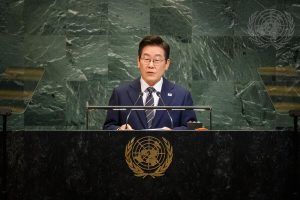On September 23, South Korean President Lee Jae-myung delivered his address at the 80th United Nations General Assembly. During the address, he specifically elaborated how he wants to construct peace on the Korean Peninsula.
“The Government of the Republic of Korea clearly reaffirms that it respects the North’s current system, that it will not pursue any form of unification by absorption, and that it has no intention of engaging in hostile acts,” Lee said in his speech. “Based on these three principles, we intend to end the vicious cycle of unnecessary inter-Korean military tension and hostile acts.”
During the presidential campaign, Lee proactively brought up the necessity of halting hostile moves against North Korea, as such responses locked the two Koreas in a vicious cycle of clashing against each other. His conservative predecessor, Yoon Suk-yeol, aggravated inter-Korean relations with attempts to provoke North Korea in order to justify his failed attempt to control the South through martial law.
“Going forward, the Government of the Republic of Korea will consistently seek a path to reduce military tensions and restore inter-Korean trust,” Lee said.
Despite Lee’s consistent pro-dialogue gestures, North Korean leader Kim Jong Un has clearly ruled out the possibility of renewing the devastated inter-Korean relations. According to North Korea’s state-controlled Korean Central News Agency on September 22, Kim explicitly said that he “will not sit down with South Korea and will do nothing together with it.”
Also, Kim clearly stated that he will never give up his nuclear weapons, citing as a pretext that he needs to abide by the North’s constitution. In 2023, four years after the breakdown of the North Korea-U.S. summit in Hanoi, North Korea amended its constitution to expressly stipulate a policy of nuclear weapon-building.
Kim specifically denounced “phased denuclearization,” the concept the U.S. and South Korea brought up to seek room for renewing the deadlocked nuclear talks with North Korea, while asserting that the denuclearization of his country will not happen.
Kim has embraced a “two-state system” on the Korean Peninsula centered on the North’s view that the two Koreas are hostile to each other. By contrast, Lee introduced his “END” initiative to create a system of peaceful coexistence on the Korean Peninsula.
“Through comprehensive dialogue centered on ‘Exchange,’ ‘Normalization,’ and ‘Denuclearization,’ in other words, ‘END,’ we must end the era of hostility and confrontation on the Korean Peninsula and usher in a new era of peaceful coexistence and shared growth,” Lee said.
Before leaving for New York on Monday, Lee said he might accept a deal that involved a “nuclear freeze,” as North Korea will not give up its nuclear weapons. He hinted again at his pragmatic approach to achieve the denuclearization of the Korean Peninsula during his address on Wednesday.
“Denuclearization is undoubtedly a grave task, but it is time to seek realistic and rational solutions based on a cool-headed perception that denuclearization cannot be achieved in the short term,” Lee said. “The international community must gather its wisdom in a pragmatic and phased solution beginning with a ‘stop’ in the sophistication of nuclear and missile capabilities, going through a ‘reduction’ process and reaching ‘dismantlement.’”
Given Kim’s clear message that he does not consider South Korea as a legitimate partner for dialogue, Lee’s blueprint for an updated approach on North Korea is unlikely to draw attention from Pyongyang. However, Lee repeatedly showed his flexibility on the methods of deterring North Korea’s nuclear development, as his top priority is not to make a nuclear-free Korean Peninsula but a peaceful one.
“The most certain peace is a state where there is no need to fight,” Lee said.
On September 24, Lee will become the first president of South Korea who presides over a meeting at the United Nations Security Council. He is expected to further reiterate his approach to the North Korea. The UNSC has taken no actions on the North Korean issue in recent years due to deadlock between the permanent members. Russia, which had rapidly expanded its defense ties with North Korea since 2022, continues to block any resolutions critical of Pyongyang, while the United States refuses to consider sanctions relief absent major concessions from the North.





























